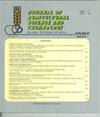Differential Floral Developmental Patterns in Some Recently Released Iranian Bread Wheat Cultivars
IF 1.3
4区 农林科学
Q2 AGRICULTURE, MULTIDISCIPLINARY
引用次数: 0
Abstract
Wheat floret primordia develop in a rather narrow window of time, mostly coinciding with stem elongation. That is why the stem elongation phase is considerd a critical period for grain number and yield determination. Under controlled conditions, floral primordia development of 10 mostly adopted bread wheat cultivars including Bayat, Azadi, Falat, Navid, Chamran, Marvdasht, Pishtaz, Shiraz, Sirvan, and Baharan, which were released during the last five decades, was studied in detail at Shiraz University, Shiraz, Iran. Floral primordia monitoring showed that visible floral degradation among wheat cultivars occurred at several floral developmental stages from green anther (GA) to anthesis (AN). Floral degradation period started from yellow anther stage and was longer in cultivars with lower grain number per spike (Bayat, Navid, Shiraz and Azadi cultivars). Also, cultivars that started stem elongation earlier, such as Sirvan, Baharan, Chamran, and Falat, had extended period for stem elongation and produced higher grain number per spike. Overall, it appeared that under short growing seasons of semi-arid regions, in which delay in flowering usually results in more floral mortality during GA to AN, cultivars with earlier stem elongation could be more efficient in production of grains.伊朗面包小麦新品种花发育的差异
小麦小花原基在相当狭窄的时间窗口内发育,大部分与茎伸长同时发生。这就是为什么茎伸长期被认为是决定籽粒数和产量的关键时期。在伊朗设拉子大学对近50年来引进的10个主要面包小麦品种巴亚特(Bayat)、阿扎迪(Azadi)、法拉特(Falat)、纳维德(Navid)、查姆兰(Chamran)、马夫达什特(Marvdasht)、皮什塔兹(Pishtaz)、设拉子(Shiraz)、希尔万(Sirvan)和巴哈兰(Baharan)的花原基发育进行了详细研究。花原基监测结果表明,小麦品种的花在从绿花药(GA)到花药(AN)的几个花发育阶段都发生了明显的退化。每穗粒数较低的品种(巴亚特、纳维德、设拉子和阿扎迪品种)花的退化期从黄花药期开始,且较长。此外,茎伸长开始较早的品种,如Sirvan、Baharan、Chamran和Falat,茎伸长时间较长,每穗粒数较高。总的来说,似乎在半干旱地区生长季节短,延迟开花通常导致更多的花在GA的死亡率,品种与早期茎伸长可以更高效的生产谷物。
本文章由计算机程序翻译,如有差异,请以英文原文为准。
求助全文
约1分钟内获得全文
求助全文
来源期刊

Journal of Agricultural Science and Technology
AGRICULTURE, MULTIDISCIPLINARY-
CiteScore
1.90
自引率
8.30%
发文量
0
审稿时长
4.5 months
期刊介绍:
Journal of Agricultural Science and Technology is one of the TMU Press journals that is published by the responsibility of its Editor-in-Chief and Editorial Board in the determined scopes.
Journal of Agricultural Science and Technology (JAST) is an international research journal published bimonthly for the purpose of advancing the scientific studies. The subjects covered by JAST include all aspects of agriculture and natural resources (see Areas Covered). The journal will consider submissions from all over the world, on research works not being published or submitted for publication towards publication as full paper, review article and research note. The Papers are published in English with an extra abstract in Persian.
 求助内容:
求助内容: 应助结果提醒方式:
应助结果提醒方式:


